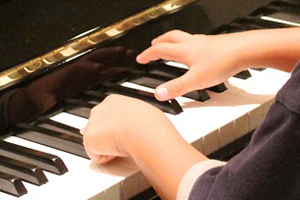Children can be quite busy these days in their schedules with school and many various extra-curricular activities. If you have considered sending your children to take music lessons, take note about all the benefits and the impact music education can have on the child’s daily life. Music is a great way for your child to relax, learn how to focus and be patient, and helps them to develop physical and academic skills while introducing them to a whole new culture.
If you hear your child making their own beats while completing everyday tasks, expressing themselves through singing or humming, or even perceiving everyday sounds differently, they may have a predisposition to making music! So when is a good time to allow your child to explore the world of music? Every child is unique and different. Some children can start being exposed to lessons as early as the age of three. At this early age kids can build skills in identifying rhythm, understanding melody and identifying different instruments and sounds. At the age of five or six children are prepared to start formalized lessons with instruments or their voice.
One of the most important aspects at the base of music education is to understand music theory. Music theory is essential for your child to be able to interpret written music to help them ease into reading and playing music. It also gives them more of an understanding of the value of music so that they develop confidence with their musical skills for years to come! It is recommended that children start studying music theory as early as they are able to write and read, about seven or eight years old. For children that are younger, simply reading and playing sheet music is a good start but theory should definitely be incorporated in the program for the future development of your little musician.
If you are wondering how many lessons and how long they should be per week, it should be based on the child’s skill level. For example, beginners would have shorter lessons for about 30 minutes a week compared to an advanced student who would need about an hour. Younger students can only take so much focus at a time so having shorter focused lessons are highly recommended. This way the child is able to process what they learned and remember it for a longer period of time. Having one music lesson a week is valuable as the child has the rest of the week to be able to practice and apply the skills they learnt. However, when the child adds theory, it could be split into two lessons a week for more focus- one practical lesson and one theory lesson. Having one-on-one lessons as opposed to group lessons is beneficial in terms of the student being able to get a program that suits their individual skills. They would also receive more attention in the hopes of helping them progress and reach their musical goals.
Parents being involved in the child’s early music education is essential for the child’s development. By monitoring the child’s practice on the daily will allow for progression and will be useful for the teacher to be able to teach the child new techniques every week. As the child has had a few years of experience, it is recommended that parents take their children to attend professional music performances specifically the ones related to their instrument. Attending various concerts and performances can help to broaden the child’s view on musical opportunities as well as teach them to appreciate music in a different light but most importantly, to motivate them to work hard towards their goals to be a great musician.


I know the cellist Anna Dubinnaya since 2008. Anna is a very experienced cellist with a solid instrumental and musical education in Russia. I am convinced, that she is able to transfer her musical and technical abilities, combined with her sensitive personality, into a successful process of teaching.